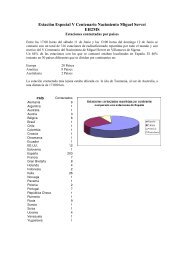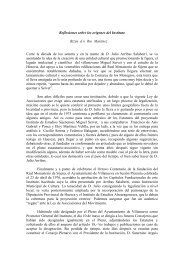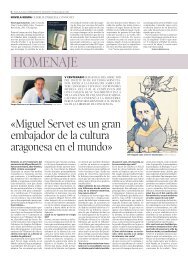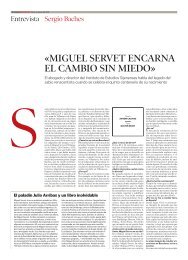New Page
New Page
New Page
You also want an ePaper? Increase the reach of your titles
YUMPU automatically turns print PDFs into web optimized ePapers that Google loves.
in life and soul, Saint John Part Six, and no-one understands the secrets of Christ's word unless Christ's<br />
spirit is with them because that examines the depths of God's secrets, as Saint Paul says in Part Two of his<br />
second epistle to the Corinthians."109 We cannot see him, however, so consistently adhering to the<br />
hermeneutical consequence as Castellio had done in his treatise certainly read by the Hungarian<br />
Antitrinitarian. It should be deemed important that the passage just quoted about Christ's disciples getting<br />
instruction besides the Scripture is not included in Rövid útmutatás. In that sense we have the presence of<br />
a downgraded, paler spiritualism with Dávid, appearing on two levels. First in his emphasizing the<br />
mutually contradictory nature of various biblical passages on seeing which man is +bewildered", and<br />
secondly in that consequently the person of the interpreter, and the road he has to make to get to the true<br />
meaning of the Scripture, assume a crucial role.<br />
On the other hand, significant differences follow from the optimistic anthropology which was formulated<br />
in Castellio's more mature works and which was rather far from Dávid's world of ideas. The selfdenial<br />
that the Hungarian Antitrinitarian demanded from his followers meant first of all getting rid of<br />
human wisdom since +human cleverness and artfulness do not go well with God's word and instead of<br />
this giving freedom for one's own and particular@kiváltképpen való explanation, all were ordered to<br />
follow the explanation of God's spirit and to find the true meaning from the process of the whole good<br />
Scripture."110 Castellio, on the contrary, forms a much more optimistic picture of the possibilities of man.<br />
Though the fall has deprived him of liberum arbitrium, it has left libera voluntas intact and this makes it<br />
possible for him to form judgements with the help of logos, spiritus and ratio, revealed in him and<br />
virtually identical with each other. Thus with him everyday common sense, called assorted names<br />
(Communis sensus, humanum iudicium, sensus hominis, sensus et intellectus hominis) is not obliged to<br />
lay down its arms, indeed, it will become the most important principle, deeply permeated, of course, with<br />
ethical elements for two reasons. For, on the one hand, it admits teachings that harmonize with a good and<br />
gracious God and, on the other, it has to discard corporeal affections if it wants to be revealed. Thus the<br />
assumption of an ethical disposition which makes the correct scriptural interpretation possible is<br />
necessary exactly so that the communis sensus be operational.<br />
These thoughts are not present in such explicit forms in the texts certainly known by Ferenc<br />
Dávid. The ethical elements in them are not intertwined as yet with the apotheosis of communis sensus.<br />
This may have had something to do with the presence of the prophetic tendency of Castellio's thoughts,<br />
manifested also in the preface dedicated to the young King of England. The belief in a vates, capable of<br />
making decisions in debated issues and endowed with special status, softened the difficulties in the<br />
exegesis of the Scripture to transient, and blunted the urgency of the rules valid in the long run. Even so,<br />
in staking out the right road indicated in the title of the short hermeneutical treatise, the element of<br />
understanding, unlike in the case of Dávid, has a role: the first task of the believers is to believe as true<br />
what is in the Scripture. Because not believing, they will not understand it either but will add profane<br />
writings to sacred things. This is followed by the second element, identical with that in Dávid: man must<br />
subject his will to God's. Common as the emphasis may be in their worlds of ideas on the contradictory<br />
and obscure nature of the Scripture, Dávid, unlike Castellio, is scared by this and is led to the paradox<br />
statement that the interpreter acts correctly if his presence in the interpretation means the annihilation of<br />
his own self. This takes him near to the principle of the reformers but since the moral preconditions of<br />
assuming the position are not automatically given, his position cannot be entirely identified with that. On<br />
the other hand, the moral requirements (wearing the crucifix, self-denial) are not actualized to the extent<br />
that they could not be metaphorically interpretable. Thus correct scriptural interpretation will not be the<br />
privilege of the saints who have turned their backs to the sinful world as is the case with the Anabaptists.<br />
The exclusivity, however, is not totally resolved since the required moral is not naturally given to man as<br />
it is in Castellio's optimistic anthropology.<br />
Thus we can see very well that the system revealed in the hermeneutical treatise of Rövid<br />
útmutatás is full of contradictions and is to some extent immature. These contradictions, however, will<br />
significantly diminish later. The emphasis on the ethical criteria will prove to be an enduring tendency but<br />
38







